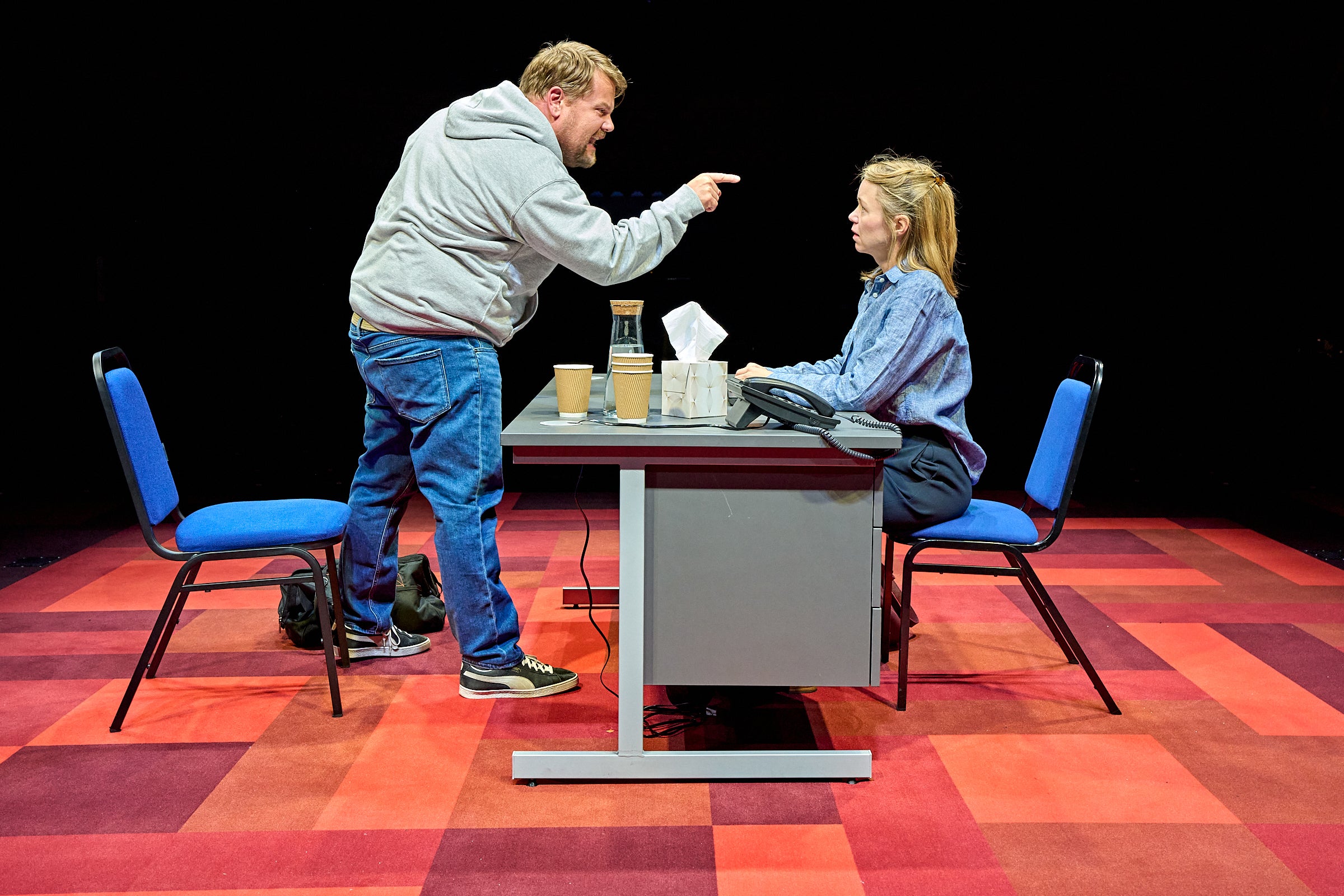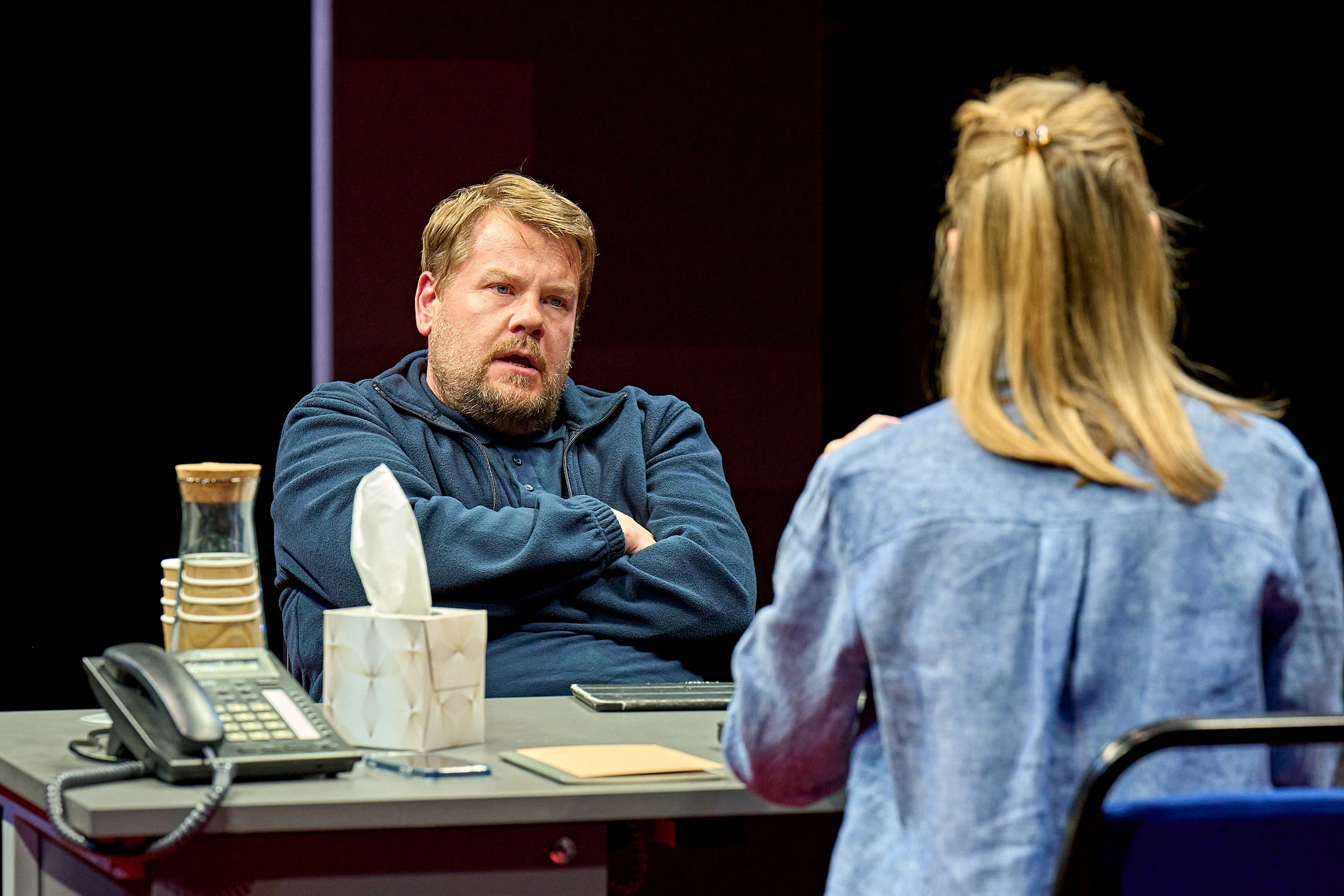The Constituent review: James Corden proves himself as a truly great actor in flawed political play
‘Motherland’ star Anna Maxwell Martin and James Corden have to battle with starchy direction and a clunky script in Joe Penhall’s new play about the threats facing MPs

Your support helps us to tell the story
From reproductive rights to climate change to Big Tech, The Independent is on the ground when the story is developing. Whether it's investigating the financials of Elon Musk's pro-Trump PAC or producing our latest documentary, 'The A Word', which shines a light on the American women fighting for reproductive rights, we know how important it is to parse out the facts from the messaging.
At such a critical moment in US history, we need reporters on the ground. Your donation allows us to keep sending journalists to speak to both sides of the story.
The Independent is trusted by Americans across the entire political spectrum. And unlike many other quality news outlets, we choose not to lock Americans out of our reporting and analysis with paywalls. We believe quality journalism should be available to everyone, paid for by those who can afford it.
Your support makes all the difference.Things have come to a pretty pass when MPs are wearing stab vests at surgeries; when abuse towards them is so constant – the threat of violence so real. That’s the thrust of this frustrating play by Joe Penhall, creator of Netflix’s Mindhunter and other good things, who cuts away the outer scab of political discourse – politicians are all venal power-hungry expenses-diddling egoists etc – to try to get at something more substantial, more careful and more human underneath.
In a much-heralded return to the London stage after years spent in LA hosting late-night American telly, James Corden plays Alec, an Afghanistan veteran who’s about to lose custody of his children. Motherland star Anna Maxwell Martin is his MP Monica, who, in trying to help, gets pulled into a dangerous situation. It’s a good setup, but one that Penhall doesn’t manage to prosecute. It’s trying so hard to be a political, timely, relevant play that the characters become mouthpieces and the thing becomes schematic.
Scenes play out in zinging back-and-forths between Corden and Maxwell Martin, two sides of an argument rather than two fully rounded characters – and not just one argument either, but many and scattershot, covering family courts, the relative rights of women and men, council cuts, lollipop ladies, restorative justice, and everything else that you might hear on an episode of Question Time. To be fair, that is probably what it’s like to be an MP, dealing with a hundred things at once without ever reaching much of a satisfying conclusion.
Corden and Maxwell Martin – plus an enjoyably annoying Zachary Hart as a police officer – really do their best to turn the characters into something more real than the lumpy script allows. Maxwell Martin brings such a sense of ease to her performance, and so much detail, the way she code switches, dropping hard consonants when she’s talking to Alec and being all posh MP when talking to the police officer.
And Corden really is a great stage actor. What was he doing all those years making the big bucks and being watched by millions, carpool karaokeing with the megastars on his American chat show, when he could have been playing to a couple of hundred people a night for peanuts? In the early scenes, he’s all zippy, beautifully timed comic delivery, his voice a permanently high-pitched barrage of speech, lots of wittering, peppered with cutting political comments about the state of the nation. By the final scenes, he gets to do the other end of the emotional spectrum, with a poignant breakdown that almost allows the play to land what it’s trying to say.
But that’s the thing: there are lots of glimpses of a great play, lots of important themes and lots of great lines. The men who’ve made threats against Monica are being investigated, the police officer assures her, because it’s classed as hate speech. “They can protect me from being hated?” she scoffs. It just never quite gets away from feeling like Penhall went “I want to write a play about violence against MPs” and called some of the arguments “Monica” and some of them “Alec”, and forced a few plot points around them. You want it to settle, to dig more deeply, rather than throw the net more widely. You want the dialogue to flow like these are real people, not ciphers being swallowed up by structure.

It doesn’t help that starchy direction by Matthew Warchus puts all the focus on the script. The actors stand on each side of a desk in Rob Howell’s deliberately unglamorous set, and they speak. Then there are abrupt, long blackouts while they add a chair. Clunk, clunk, clunk.
Nevertheless, 90 minutes whip by, important points are raised, some great acting occurs, and there’s something to be said for the fact that – like the decent MPs Penhall wants to champion – these three actors are doing their best in a structure that’s fundamentally flawed.
Old Vic, until 10 August
Join our commenting forum
Join thought-provoking conversations, follow other Independent readers and see their replies
Comments